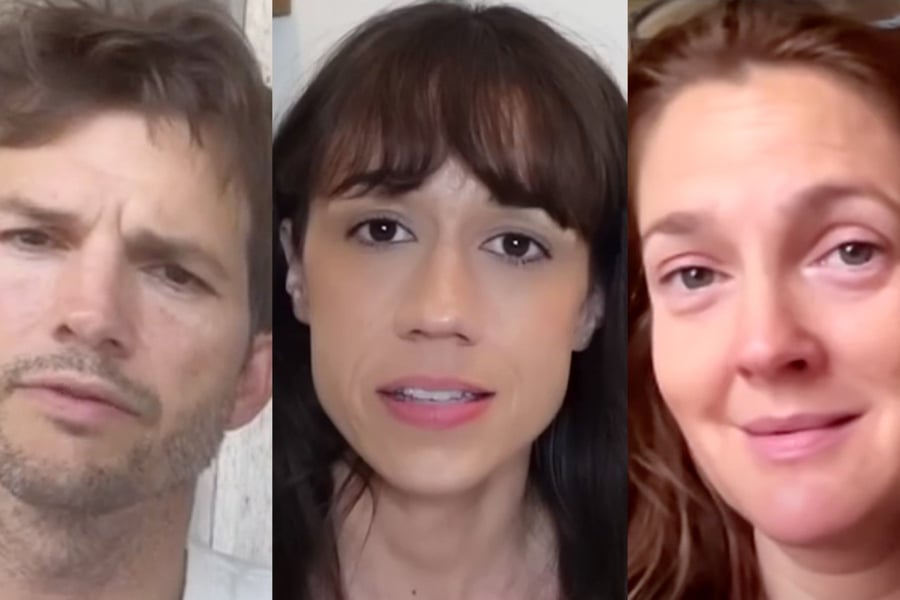As long as there have been celebrities, there’ve been celebrity apologies.
It’s a common cycle, one that’s fed the entertainment gossip pipeline for years: a famous person messes up, people are disappointed in them, and then they apologize, free to live in uncanceled bliss until, you guessed it, they mess up again. One thinks of Tiger Woods’ apology press conference, or the media gamut Reese Witherspoon ran after her arrest following her husband’s 2013 DUI. But over the past few months, something has been getting harder and harder to ignore: Gone are the good old days of crisp white statements sent out from PR companies, or even the quiet notes-app screenshot posted to social media accounts. Now, celebrities film apologies directly to their cell phones, trying to approach their followers and audiences like just an average person.
But what even a carefully followed script can’t give celebrities is legitimacy. Instead of coming off like a friend who messed up, the videos read out-of-touch and awkward, their eyes darting around like their PR person is standing behind the camera threatening to snap their Van Cleef necklaces or Erewhon membership cards. The name of the game right now is apology videos, and they’re not just cringe — they’re straight-up embarrassing.
Take, for example, Drew Barrymore’s now-deleted video apologizing for returning to her daytime talk show in the middle of the ongoing WGA strike. On Sept. 10, Barrymore announced that her show would return without writers, a decision met with instant backlash. After the National Book Awards Foundation dropped Barrymore as a host, and WGA members picketed her studio, Barrymore posted and then swiftly deleted an apology video. “I believe there is nothing I can do or say in this moment to make it okay,” she said. “I wanted to own a decision so it wasn’t a PR-protected situation.” Besides the fact that it took Barrymore almost a minute into the video to actually apologize, the video is deeply cringe. Barrymore begins with a smirking grin at her camera, before her expression devolves into one of seriousness and then close to tears. Even her eyes can’t figure out what the vibe is, and they move wildly between the camera and a fixed point off-screen.
In fact, the talk-show host’s mea culpa is just one example of how ridiculous celeb apologies have gotten. While PR statements might be crafted behind the scenes, they’re no longer mailed out, instead read by celebrities who look like they’re on their third or fourth take. They usually appear stone-faced, or like they’ve been crying recently. This implication is shored up by a noticeable lack of makeup. “I understand you’ve been hurt,” the videos seem to imply. “But look at me, I’m hurt too. I had to film this in one of my many, many guest rooms.”
In the case of Mila Kunis and Ashton Kutcher, the couple didn’t even use a new background when they apologized for writing letters in defense of Danny Masterson during his rape trial. Instead, they staged their apology in front of the same wooden wall they used when mocking the out-of-touch celebrity “Imagine” video. The That ’70s Show stars went above and beyond in their video, not only appearing without makeup, but also with disheveled hair and clothing as they both stood by the letters they wrote and re-emphasized that they believe women — two things that seem antithetical to each other.
“The letters were not written to question the legitimacy of the judicial system or the validity of the jury’s ruling,” Kunis said, when she wasn’t busy nodding after every word of Kutcher’s. “We support victims. We have done this historically through work and will continue to do so in the future.” After their video was poorly received, Kutcher and Kunis also resigned from their positions at Thorn, the Kutcher-co-founded organization dedicated to stopping sex trafficking.
Love Music?
Get your daily dose of everything happening in Australian/New Zealand music and globally.
And who could forget the apology from disgraced YouTuber Colleen Ballinger, a part-speech, part-jingle ukelele romp that was so reviled online that it was even mocked at the 2023 Streamy Awards? Following a Rolling Stone report that detailed the accounts of four former fans who described interactions with Ballinger as toxic, exploitative, and hurtful, Ballinger posted a video to YouTube, never actually apologizing or addressing the allegations head-on, but rather comparing herself to the weird aunt at a family gathering who wants to know the gossip from the cool teenagers. Memorable moments include the constant refrain of a “toxic gossip train,” and the line, “The only thing I’ve ever groomed is my two Persian cats.”
Audiences aren’t dumb. Most people understand celebrity apologies are usually issued to save their careers and egos rather than out of genuine regret, which is why each of the videos mentioned above inspired swift and immediate backlash rather than fawning applause. The celebrity shift from a glossy public relations response to a shaky, unpolished, apology video might be an attempt to meet the average fan where they are, but so far, all they’ve done is dig deeper holes for celebs already on people’s bad side. Because on the internet, mistakes might be temporary, but cringe is forever.
From Rolling Stone US



































